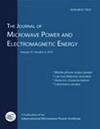编者按:微波效应的通讯应用与感知
IF 0.9
4区 工程技术
Q4 ENGINEERING, CHEMICAL
Journal of Microwave Power and Electromagnetic Energy
Pub Date : 2019-10-02
DOI:10.1080/08327823.2019.1682364
引用次数: 0
摘要
根据微波会议和期刊上的出版物,对非通信应用领域的兴趣涵盖了广泛的主题,如农业、生物医学、化学、介电特性、干燥、能源、食品、工业和放大、建模、烤箱设计、等离子体和固态等。非热微波效应仍然是一个有争议的问题,至少在它的理由方面,尽管有许多有充分支持的报道,与传统加热相比,微波的反应速率更高。激活不同的反应机制,无论是体积加热还是选择性加热,都可以为系统提供更多的能量,可以解释这种观察到的效应。在两步烧结过程中,温度在短时间内高于烧结设定值,这可能是涉及热问题的一种例子。因此,对于非热研究来说,准确地了解样品中的温度分布是至关重要的,这通常是困难的,因此可以通过建模来计算或估计值。尽管有这样的不便,但有报道的结果严重挑战了热解释,这就是微波研究领域活跃的原因。然而,一些关于微波效应的言论,主要是在互联网和社交网络上,声称微波是疾病的原因,改变营养膳食价值,并对健康生活产生其他影响,包括不孕不育。甚至在这些普遍的主张之前,安全性就已经是一个问题,尽管它们不可能,因为微波能量的性质没有足够的能量来破坏化学键,哺乳动物的热调节,产生这样的后果。在商业互联网出现之前,这些话题就已经被研究过了,当然,互联网社交网络的渗透能力使得几乎任何主题都能吸引广泛的受众。关于证明微波效应的实验,有一些,甚至在公平的科学项目中提出,尽管准备充分,但具有与学生水平相应的科学严谨性。例如,有一个实验,用微波加热的水浇灌植物,然后让水冷却,而不是自来水浇灌,通过对比两种植物的外观,他们得出了关于微波效应的结论。为了公众利益,这变成了一个感知而不是科学的问题,社交网络提供了直接得出结论的机会,而不需要任何证据,从而使读者理解一般知识和常识。表1显示了从谷歌搜索中找到的pdf文档数量的大致排名,该搜索结合了关于主题的不同单词。每次进行搜索时,数量都会发生变化,但它们在相同的范围内,排名保持不变。文件的数量不能直接作为兴趣的度量,因为它们的可用性取决于与受欢迎程度和可获得性有关的因素。尽管如此本文章由计算机程序翻译,如有差异,请以英文原文为准。
Editor’s message: Communication applications and perception of microwave effect
According to publications on microwave conferences and journals, the interest in the field of not communication applications covers a wide range of topics, such as agriculture, biomedical, chemistry, dielectric properties, drying, energy, food, industrial and scale-up, modelling, ovens design, plasma, and solid state, among many others. Non-thermal microwave effect is still a controversial issue, at least in terms of its justification, although there are many well supported reports of higher rate reactions with microwaves compared to conventional heating. Activation of different reaction mechanisms, and either volumetric or selective heating, more energy into the system, could provide an explanation to this observed effect. The two-step sintering process where temperature is increased above the sintering set point for a short time could be a sort of example of thermal issues involved. Therefore, it is essential for non-thermal studies to accurately know the temperature profile in the sample, which often is difficult, so that values are calculated, or estimated, though modelling. Despite this inconvenience, there are reports with results that seriously challenges thermal explanations, and that is why this field of microwave research is active. However, some words regarding microwave effect have been taken, mostly in the internet and social networking, for claiming that microwaves are cause of illness, alter nutritional meal values, and have other effects against healthy life, including infertility. Even earlier than these generalized claims, safety has been an issue, regardless their impossibility due to nature of microwave energy being not energetical enough to break chemical bonding, and thermal regulation of mammals, to produce such consequences. These topics have been studied as they have arisen, quite before the commercial internet and, of course, internet social networking, which penetration power made almost any subject interesting to a wide audience. Regarding experiments to proof the effect of microwaves, there are some, even presented in fair science projects that although well prepared, have a scientific rigor accordingly to the student’s level. For instance, there is an experiment where plants were watered with water that was previously heated with microwaves and then left to cool down, against running water watering, with the comparation of the appearance of only two plants, they made conclusions about microwave effect. For public interest, this becomes a matter of perception rather than science, social networks offer the chance to cast conclusions directly, without any proof, leading understanding to the general knowledge and common sense of the readers. Table 1 shows a roughly ranking of the number of pdf documents found in internet from a google search combining different words about the subject. The number changes each time that the search is conducted, but they are within the same range and ranking remains the same. Counting of documents cannot be taken as a measurement of interest directly, because their availability depends of factors related to popularity and accessibility. Despite this
求助全文
通过发布文献求助,成功后即可免费获取论文全文。
去求助
来源期刊

Journal of Microwave Power and Electromagnetic Energy
ENGINEERING, CHEMICAL-ENGINEERING, ELECTRICAL & ELECTRONIC
CiteScore
2.50
自引率
6.70%
发文量
21
期刊介绍:
The Journal of the Microwave Power Energy (JMPEE) is a quarterly publication of the International Microwave Power Institute (IMPI), aimed to be one of the primary sources of the most reliable information in the arts and sciences of microwave and RF technology. JMPEE provides space to engineers and researchers for presenting papers about non-communication applications of microwave and RF, mostly industrial, scientific, medical and instrumentation. Topics include, but are not limited to: applications in materials science and nanotechnology, characterization of biological tissues, food industry applications, green chemistry, health and therapeutic applications, microwave chemistry, microwave processing of materials, soil remediation, and waste processing.
 求助内容:
求助内容: 应助结果提醒方式:
应助结果提醒方式:


